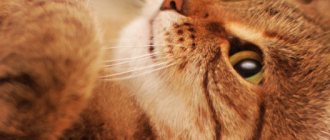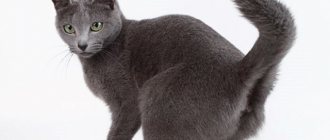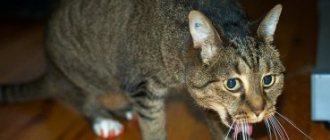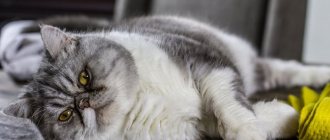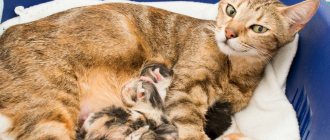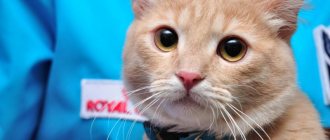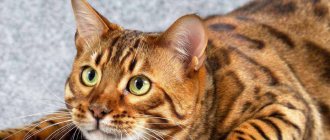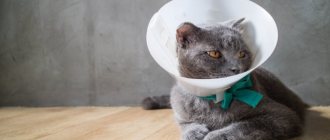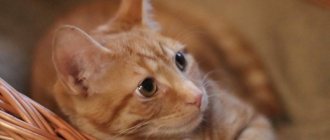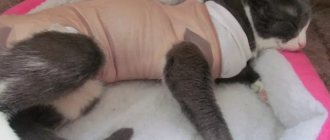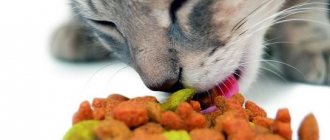Causes of lack of appetite
There may be several reasons why an animal refuses food or eats poorly after castration:
- pain after surgery forces the cat to refuse food, in this case he can be given painkillers prescribed by the veterinarian;
- nausea that occurs after anesthesia usually goes away within two days. When the cat does not eat for 3-4 days, you must contact the clinic;
- constipation due to intestinal dysfunction, which is provoked by anesthesia, may cause a lack of appetite in the animal. In this case, there will be additional symptoms: plaintive meowing, failure to go to the toilet, trembling of the cat’s backside;
- the animal’s poor health and lack of strength also explain why the cat does not eat after castration.
Usually, after complete recovery, the pet’s appetite returns and he continues his active life. It is not recommended to change the diet; you should give the usual food, only in a softer form. Normal appetite may not return immediately, and if a cat begins to eat little after castration, this does not mean that he is sick. The cause may be manifestations of emotional and hormonal changes.
How to feed a cat correctly?
If the cat has lost a lot of weight, the owner may have incorrectly compiled the daily diet and menu for the pet. There are a number of rules thanks to which you can maintain a stable weight of the animal and protect your family pet from threats:
It is important to choose only one food option, otherwise the cat will not only lose weight, but may also get sick. This is a branded industrial feed or natural food. You can find branded food by the labels holistic, premium and supreme. These are classes that confirm compliance with high production standards.
Do not mix natural food and industrial feed. A cat develops one type of digestion, aimed at “artificial” or natural food. Your cat will need more moisture to digest the crackers. With constant changes in diet, the digestive system cannot adapt in a timely manner, which is why the stomach and intestines suffer.
Don't trust advertising. The brand names Whiskas and Kitiket, which have already become household names, do not become a sign of quality .
These are affordable feeds to which attractive agents are mixed. These are components that act like a drug and are addictive. This is a serious burden for a pet’s gastrointestinal tract. A cat will live a long time if you feed it food that is sold in specialized stores, and not on supermarket displays.
Effect of surgery on metabolism and appetite
After the pet is brought home after castration, it does not need a diet. In a couple of days the pet will come to its senses. If the cat starts eating, then everything is fine. There is no need to specially force him; it is better to leave the food overnight, because cats are nocturnal animals and at this time of day their appetite is better.
After castration, a cat may not eat well due to a change in its taste preferences. What he liked before the operation no longer causes his appetite and vice versa. You need to watch your pet and pay attention to what he chooses from food.
If your kitten is experiencing mental discomfort, you can tempt him with foods he loves. This will serve as a way out of post-operative depression. You can give fried chicken after removing the skin. This dish has a strong aroma and is not heavy on the stomach.
The animal's appetite usually improves by the time mobility is restored, but if the cat does not want to eat after castration surgery for several days, this indicates the development of some complications.
In the case of the myth about excess weight in cats after castration, smoke appeared not without fire. The changes happen very smoothly, so many owners don’t even have time to notice how their fit, playful cat becomes a cute little bun who only eats and sleeps.
How quickly the body begins to rebuild depends on the age at which castration was performed. According to general recommendations, castration is best done when the kitten is 6–7 months old, but has not yet entered into heat (up to 9–10 months).
You need to understand that normally, a kitten’s testicles descend into the scrotum while still in the womb. At the age of 4–5 months, the pet experiences the first hormonal surge, caused by the natural processes of formation of the body.
If the cat was castrated before the first failure, that is, at the age of 3-4 months, his temperament and habits will practically not change. Many veterinarians are against early castration, but European experience shows that both females and males tolerate the procedure without complications and recover faster.
Castration at the age of 6–9 months is approved by the vast majority of veterinarians, since the kitten has already developed physically, but its body has not had time to rebuild. In this case, the changes after castration are insignificant.
Now let's figure out what exactly is changing. When in a state of heat, the cat spends a lot of energy searching for a partner. The pet marks, screams, sleeps poorly, and is constantly in a state of stress.
The longer the cat walks in vain, the more stress builds up... that is, the body constantly consumes energy and requires its replenishment. The cat begins to eat more and sleep less, and this requires even more energy. As a result, the cat eats a lot, but also spends a lot of energy.
If a cat is released outside during the heat period to find a partner, its energy needs increase incomparably. Being in conditions of competition for the right to mate, the cat is not only stressed, he is forced to fight, constantly control his territory... and it is not a fact that the male will achieve his goal. The female will choose the strongest cat, and whoever is stronger will decide in a fight.
Now imagine that you went to the gym for more than a year, ran, swam, but suddenly gave up everything. However, the quality and quantity of food you consumed remained unchanged. What will happen?
What can you do to protect your cat from gaining weight and keep him healthy? To begin with, let’s define that obesity is not a nice feature, but a disease that affects the functioning of the heart and the condition of the skeleton. Cats are not naturally fat and cheeky. Cats are nocturnal predators, muscular, fit, agile and very fast animals.
If you castrated a cat at the age of 1 year or older, you will have to work not only on the diet, but also on gradually reducing the amount of daily food required. As soon as you notice that the cat has begun to gain weight, the calorie content of its diet should be reduced by 20–30%.
Why doesn't a castrated cat get fat?
Dry nose in a cat: main causes and what it means
There is an opinion among owners of cats that have not yet been neutered that as soon as castration occurs, absolutely everything in the character, lifestyle and behavior of the animal will change. Cats become calm and even lazy, stop marking, and begin to quickly gain weight. In relation to probably 70-80% of castrated animals, this opinion is justified, since it is based on the knowledge that after the procedure the hormonal levels change, the cat’s metabolic processes slow down, which means it becomes less energetic. But this doesn't always happen.
Note! If the animal was neutered late, at 1.5-2 years, then there is a high probability that there will be no sudden changes, so the sight of a skinny cat should not be alarming.
The absence of changes in weight is also affected by proper feeding. So, if a cat consumed dry food before castration, then changing the food (switching to natural products) affects the weight (the cat gets fat). If the cat is fed according to the same scheme as before, then no changes occur.
Much also has to do with the breed. British cats immediately after castration begin to consume more food, their body weight quickly increases by 2-3 times. The body weight of a neutered yard cat remains unchanged. The procedure can affect this parameter, but, like with people, everything is individual, some pets cannot gain weight just because of castration, therefore, if the owner dreamed that he would have a fat and very lazy cat, he may have to be disappointed .
Castration procedure
Castration should be carried out on an empty stomach, due to the fact that general anesthesia is used. The pet is not fed 12 hours before surgery and is not given water for 6 hours. A kitten that is 7-10 months old is suitable for castration. If the cat is older than two years, additional examination is required before castration:
- blood tests;
- ECG;
- Ultrasound of the abdominal organs.
Two weeks before the operation, you need to get vaccinated and give the kitten an anthelmintic. After removal of the testicles, it is necessary to provide him with conditions for normal recovery.
Devuli, I have a Cornish Rex. For those who are not in the know, these are very slender animals and lean (they should be)
When we adopted our Marik, he was the largest in the litter, his father was a champion in shows, his mother was a club beauty. Marik, when he was growing up, was overweight, but only because he was large in himself (not fat), but he was always slender and lean. As soon as he was castrated (closer to a year), he began to crawl apart before our eyes. He eats exactly his dosage of Holistic Go food with an excellent composition. He looks like he's pregnant, by God. But he is just as active and playful as before, with no health problems. It weighs 5 kg, 700 g. Although according to breed characteristics, cats should not weigh more than 4.5 kg.
Should we sound the alarm, or do all castrati become this fat?
I apologize for the quality of the last photo. Dark.
Mr. Cat recommends: diagnosis and treatment
So, the cat is thin, lethargic and apathetic. You need to go with her to the clinic or call a doctor at home.
The veterinarian will ask about the animal’s age, nutrition and all other details of the animal’s life, the owner must provide accurate information for a better diagnosis.
After the examination, the pet will be sent for blood tests, stool tests and x-rays. Once the problem is clear, your doctor may prescribe the following:
- Medicines.
- Change of diet.
- Vitamin supplements.
- Change of activity mode.
We recommend reading: If a Cat Is Drooling
- Diseases. The veterinarian will prescribe tests, then therapy.
- Senile wear of teeth. The solution is to buy new soft food.
- Parasites. The doctor will prescribe anthelmintic drugs.
- Change of food. In this case, it is recommended to introduce innovations gradually, allowing the animal to get used to it.
- Stress. If your cat is depressed by changes, you need to give her time to calm down. In serious cases, the doctor will prescribe sedatives.
- Maturation. If a pet needs breeding, you need to find a mate for it or castrate it.
When an animal is eating consistently but not gaining weight, pet owners sound the alarm. Many people believe that if a cat eats, then weight gain is a natural process. This is not entirely true. Animals, like people, are active and dynamic, which burns extra calories and helps the pet lose weight. When a cat loses weight but eats well, this is normal. With active life, weight loss is ensured by normal metabolism. The situation is different with sedentary cats.
Don't expect your kitten to actively gain fat. During the first 9-11 months, kittens develop their skeleton and posture, and the baby gets fat and loses weight. Young cats and female cats become soft and plump 1-2 years after birth.
What problems does castration solve?
Castration should be carried out on an empty stomach, due to the fact that general anesthesia is used. The pet is not fed 12 hours before surgery and is not given water for 6 hours. A kitten that is 7-10 months old is suitable for castration. If the cat is older than two years, additional examination is required before castration:
- blood tests;
- ECG;
- Ultrasound of the abdominal organs.
Two weeks before the operation, you need to get vaccinated and give the kitten an anthelmintic. After removal of the testicles, it is necessary to provide him with conditions for normal recovery.
Let's look at the main reasons why owners decide to castrate a cat. Experienced animal lovers castrate their pets without any reason and before the onset of sexual heat.
This method is the most reasonable because it allows you to avoid most behavioral problems and health difficulties for your pet. The optimal age for castration is considered to be the period from 7 to 9 months, when the cat’s body is physiologically formed.
A very thin cat: signs of exhaustion
Weight loss in pets remains invisible to owners until a certain time, especially if the cat is covered with long hair.
Some active animals maintain a slim figure for the rest of their lives, so it is important to understand the difference between physiological moderate thinness, or, as they say, leanness (when the animal has a small layer of subcutaneous fatty tissue) and a pathological condition
Normal thinness
For example, many owners are concerned about why a neutered cat is thin and not gaining weight. However, in most cases, there is no reason to worry, there is simply a myth that after castration the animal must certainly gain weight, and if it remains the same weight, then this is a sign of illness.
Normally, a cat's waist is clearly visible. The ribs and pelvic bones are not externally distinguishable, but they are easy to feel. You can feel a thin layer of fat under the skin of the chest and abdomen with your fingers.
When is it time to sound the alarm?
When an animal is severely exhausted and dehydrated, they speak of cachexia - a state of extreme exhaustion of the body. A cat with cachexia has thin limbs, the fur becomes dull and disheveled, the stomach is retracted, the ribs and protrusions of the pelvic bones are clearly visible.
The fat layer in the chest area is very thin or cannot be felt at all, and is absent in the abdominal area. In this condition, the muscles atrophy, the pet becomes less energetic, and sometimes the weakness is so severe that the cat is not able to cope with its physiological needs in the usual way.
Cachexia can develop gradually, over a long time, or rapidly - it all depends on the disease that caused it.
Recovery period
After a correctly performed procedure, the animal should recover within the first 24 hours. It is necessary to provide care, access to water and liquid food; when the cat recovers from anesthesia, he will begin to eat and drink on his own.
After surgery, the animal should sleep as much as possible, then it will recover faster. Children and other pets should not be allowed near it.
It is better if the kitten's sleeping place is on the floor on a special bed. Then the risk that he may fall from a height and be injured will be minimized.
Some individuals may become so disoriented that they will begin to hide in inaccessible places and try to climb onto a cabinet. This should not be allowed; the kitten may fall or damage the seam.
What is the character of a Scottish Fold cat?
Scottish Folds are distinguished by their kind, calm and balanced character. Their lifestyle is quite measured, hyperactivity is usually not typical for them. You are unlikely to constantly find such a pet trying to climb onto the closet and over the curtains, or simply rushing briskly around the rooms. But this does not mean that Scottish Fold cats are absolutely passive and behave like plush toys. They are naturally quite curious and enthusiastically explore everything that surrounds them.
How Scottish Fold cats get along with adults
Representatives of this breed are very loyal and sincerely become attached to people. It is believed that they choose one object of adoration, but this is not always the case. Many Scots treat all family members equally warmly and single out someone especially based on their mood.
Scottish Folds readily show their emotions and love to communicate using meows and purrs. Demonstrating affection, they can literally follow a person around the apartment.
And in attempts to gain attention, they often show persistence and willfulness.
Most Scottish Fold cats are not very fond of being cuddled or picked up. Although depending on their mood they may well purr on their knees. They usually have nothing against stroking and other caresses.
How Scottish Fold cats get along with children
When communicating with children, purrs are patient and calm. Aggression is rarely shown, and to provoke it, you need to try very hard. They don’t always like too much fun and noisy games, so cats try to avoid such activities and sit on the sidelines.
Anesthesia as a cause of lack of appetite
As a rule, today veterinarians try to perform castration using general anesthesia. This is especially true for animals whose sterilization is carried out at the age of more than a year. In this case, the risk of painful shock and all the unpleasant consequences associated with it is quite high.
General anesthesia allows you to completely numb the surgical field and also eliminates many problems associated with the need for careful fixation. The cat, no matter how much it wants, will not be able to escape from the operating machine, and therefore will not cause injuries or mutilation to itself.
But still, anesthesia is not ideal. In particular, many animals have a rather difficult time recovering from the effects of general anesthesia, they wake up for a long time after surgery, at which time their coordination of movements is noticeably impaired, there is no appetite, etc.
It happens that cats castrated at the age of four to five years remain in a “comatose” state for a week. They eat poorly, sleep a lot, and tend to move less. True, this rarely happens. More often than not, animals fully recover from the consequences of surgery within two to three days.
All these phenomena are temporary and go away on their own after some time. As a rule, medical assistance is not required for this. How can you tell if your cat is eating poorly because of the effects of general anesthesia? It's pretty simple:
- The animal took a long time to wake up after the operation; by the end of the first day after awakening, problems with coordination of movements persisted. For example, for this very reason, some cats cannot use the litter tray normally and do “their business” past it.
- The pet was vomiting and was very thirsty. All this indicates a severe reaction of the animal’s body to the drugs used during general anesthesia.
Be that as it may, if these signs appear, we would strongly advise taking your pet to a veterinarian.
This will not be superfluous: at least you will make sure that everything is fine with the animal, and its long “hibernation” is the result not of pathology, but of an inadequate response of the animal’s body to the action of anesthetic drugs.
Emergency assistance before the veterinarian arrives
At the first signs of refusal to eat, the main thing is not to panic and try to soberly approach the issue of determining the reasons:
- Eliminate the possibility of purchasing unsuitable food
- Try replacing food
- Call emergency veterinary help
- Do not start self-medication
- Test your cat's sense of smell while giving her warm food from your hand.
- Watch the cat, especially if you are in a suburban area - maybe the cat ate a mouse or ate from the neighbors
- Avoid pet overeating
Every owner of a cat must remember that neglect of a pet can affect the occurrence of poor appetite and the development of dangerous diseases. Contacting a veterinary clinic when the first symptoms of food refusal appear will help the veterinarian quickly make a final diagnosis and prescribe the most effective treatment.
The health of your pets is in your hands, and attention and care will help prevent the appearance of the above-described signs associated with loss of appetite
Inflammatory processes
Unfortunately, this group of reasons is also quite common. Inflammatory processes in the operated scrotum have a serious impact on the animal’s well-being, which is why the cat does not show interest in even the most delicious food. The development of inflammatory processes is associated with gross violations of the rules of asepsis and antisepsis during surgery.
In addition, there are situations when a cat quickly comes to its senses after the procedure, starts playing, runs outside, and does other “indecent things.” All this can lead to contamination of the cavity of the scrotal sac and its bacterial contamination.
This is dangerous not only due to the possibility of developing an inflammatory process, but also due to septic and necrotic processes. And this is a direct threat not only to the health, but even to the life of your pet.
How do you know if your cat has had a bad surgery and needs to be seen by a veterinarian as soon as possible? Take a closer look at your pet.
You should be concerned if you see the following signs:
- The pet feels unwell, breathes heavily, eats little or refuses food altogether, but at the same time drinks liters of water. This is how the cat’s body tries to cope with the consequences of intoxication.
- Look at the scrotum area: if an inflammatory process has developed there, the organ swells, turns red, and exudate oozes from the wound canal. If the case is advanced, the animal smells bad, the animal’s general body temperature rises, the cat is depressed and tries to spend more time huddled in the most remote corner.
- The genital area looks extremely untidy, the fur in this area looks like icicles. It sticks together, being saturated with exudative secretions.
If you notice these symptoms, you should immediately take your cat to the veterinarian. If an animal in this condition is not provided with timely medical assistance, it may well die from sepsis.
In such cases, it is necessary to excise areas of dead tissue. The animal is prescribed loading doses of broad-spectrum antibiotics and other antimicrobial drugs.
In some cases, the use of anti-inflammatory corticosteroids is recommended. They improve and accelerate the regeneration process.
Symptoms
The first thing you need to pay attention to is the general condition and mood of the cat. An unhealthy Scottish Fold will be lethargic, apathetic, lack of appetite, sometimes irritable reactions and unreasonable aggression
The nose becomes dry and very hot to the touch. Perspiration may appear on the fur. When measuring temperature, the readings will exceed 38.5 °C.
An unhealthy Scottish Fold will be lethargic, apathetic, and lack of appetite.
In specific diseases, the cat owner can focus on the symptoms.
Table 2. Symptoms of diseases of internal organs
| Type of disease | First symptoms |
| Viruses | Sneezing, discharge from mouth and nose, fever |
| Ear | The cat shakes its head, discharge from the ears (pus, fluid), putrid smell from the shells, redness of the skin in the shells, the cat scratches its ears |
| Ophthalmic | Redness, lacrimation, purulent discharge, swelling of the eyelids of varying degrees, the cat tries to scratch the eyes, poor orientation in space, cloudy pupils |
| Digestive | Refusal to eat, vomiting, nausea, constipation, diarrhea, undigested pieces in feces, increased thirst |
| Skin | Scabies, redness, bald patches, rashes, sores, blisters, peeling, nodules |
| Heartfelt | Shortness of breath, cough, swelling, increased frequency of sighs, low temperature, fainting |
| Genitourinary system | Sudden weight loss, pink urine, apathy, frequent urination, the cat meows when urinating, fussing |
| Bone | Disproportionately large head, crooked, protruding jaw, shortened limbs, curvature of the spine, twisted front legs, joints with a swollen effect, too massive joints, growths on them, slow or absent growth of the cat, shortened thick tail, inactivity, clumsiness of movements, attempts not to bend the paws when moving |
| Dental | Foam, pus, excessive drool from the mouth, bad odor from the mouth, yellow, brown, gray growths on the teeth, brittle teeth, refusal to eat (it hurts to eat) |
In the early stages, 2-3 mild symptoms may be observed. As the pathology develops, the number of manifestations increases. It is necessary to monitor your fold ear and consult a doctor at the first suspicion of abnormalities.
Refusal to eat may indicate health problems in your cat.
Changes in eating after surgery
After the operation, the animal’s body is rebuilt and at first the kitten may even lose weight, but if it begins to gain weight rapidly, its diet needs to be reconsidered.
After the pet is brought home after castration, it does not need a diet. In a couple of days the pet will come to its senses. If the cat starts eating, then everything is fine. There is no need to specially force him; it is better to leave the food overnight, because cats are nocturnal animals and at this time of day their appetite is better.
After castration, a cat may not eat well due to a change in its taste preferences. What he liked before the operation no longer causes his appetite and vice versa. You need to watch your pet and pay attention to what he chooses from food.
If your kitten is experiencing mental discomfort, you can tempt him with foods he loves. This will serve as a way out of post-operative depression. You can give fried chicken after removing the skin. This dish has a strong aroma and is not heavy on the stomach.
The animal's appetite usually improves by the time mobility is restored, but if the cat does not want to eat after castration surgery for several days, this indicates the development of some complications.
Many owners find themselves in the very unfortunate position of expecting castration to solve all of their pet's behavioral problems. If you are one of them, rest assured that you need to familiarize yourself with additional information about the hormonal background of cats and the process of its formation.
There is nothing wrong with an inexperienced owner not knowing the subtleties and nuances of a pet’s sexual development. However, some misconceptions can lead to common mistakes that are easy to avoid.
Important! After castration, the cat’s hormonal background gradually comes into balance. If the animal is castrated on time, the process of restructuring the body will take a minimum period - up to three months.
If you castrated a cat when he had already begun to mark, look for a cat, protect his territory, or had already become a father, you will have to wait longer for improvements in behavior. Based on the experience of the owners, cats can exhibit sexual activity and experience arousal during the sexual heat of females for another year.
Important! The cat continues to “stomp around” and call for the cat for a year or more. When challenging sexual behavior fades into the background, the pet continues to defend its territory and mark.
During rehabilitation, the cat’s behavior must be closely monitored. It is advisable to switch your pet to a “safe” diet. Castrated cats should absolutely not be fed salty food, given fish frequently, or allowed to gain excess weight. Perhaps not immediately after castration, but over a short period of time, the pet's energy needs will be reduced by 30-40%.
It is important for the owner to notice changes in the cat’s behavior in a timely manner and adjust the diet. It is necessary that the portion of food consumed remains the same in volume, but contains fewer calories. If your cat eats natural food, carbohydrate foods are excluded from the diet and more dairy products and meat by-products are introduced.
Note! For pets who are accustomed to industrial food, manufacturers are developing special product lines for castrated and sterilized animals.
Physiological reasons for a cat losing weight
The condition of the animal is influenced by many factors, for example, living conditions, hormonal changes, character, changes in the cat’s life and others:
- Spring is the period when a cat needs to go for a walk, so food is often the last thing the animal thinks about. Its mass decreases at this time, but when all its needs are satisfied, it begins to recover.
- Changes in temperature: for example, before winter, mammals gain fat, losing it in warmer times.
- Any surprises in everyday life cause trauma to the animal. For example, having a child, moving, a new pet.
- A pregnant or postpartum cat usually has an excellent appetite as she feeds her babies. If there are too many kittens, the mother will lose weight, but after the end of the feeding period her weight will return to normal.
- Some breeds (Siamese, Abyssinians, Sphynxes, Bengals and others) have an excellent appetite, which does not affect their figure.
- The cat is sensitive to food, so changing food may not suit her at first, so she will experience a weight loss in the first week.
If your cat is healthy but losing weight, there is no need to worry if he has:
- A specific breed - Somali, Abyssinian, Bengal.
- Active, mobile lifestyle.
- Age over ten years.
- Changes in life (moving to a new home, change of owners, new litter box)
If the pet is calm, but the weight loss is too sudden, then the following symptoms will be a sign of the disease:
- Changing your lifestyle from active to sluggish and apathetic.
- Drowsiness.
- The appearance of an unpleasant odor.
- Loss of tufts of fur, matting in tangles.
- Blood in excrement.
- Diarrhea, nausea or constipation.
- Pallor of the mucous membranes.
- Temperature increase.
How to properly return a cat to normal life?
So, you took your pet to the veterinarian and found out why the animal's appetite has decreased. Let's assume that as a result of timely medical care, the cat began to become interested in food again. But what to do next?
Important! Belly feeding an animal that has not eaten anything for a long time is a very bad idea. At best, this is fraught with digestive disorders, at worst, intestinal obstruction and death.
In a word, you should stop the “diet” gradually. First, you need to give your cat small amounts of chicken broth (low-fat).
After a few hours, you can add a little boiled chicken or lean offal to this dish. If everything is normal and your cat’s digestive system gradually adapts to its normal operating mode, then after about a week you can feed your pet as usual.
But! Please note that the nutrition of castrated cats has its own nuances. Firstly, the calorie content of the daily diet should be reduced by about one and a half times. Secondly, if the pet was spayed at the age of more than four years, it is necessary to limit the amount of protein. Thirdly, we strongly advise you to completely exclude fish from the animal’s diet.
Why does a cat need grass?
An indispensable ingredient in the diet of a cat that is losing weight is green grass. This is a natural food that has a positive effect on the functioning of the digestive system. The grass contains zinc, manganese, pantothenic acid and vitamins of various groups, which are necessary to rid the body of parasites and strengthen the immune system.
Constantly monitoring the weight and whether the cat is losing weight or getting fat is the right decision. This is an indicator of the development of the body, the appearance of symptoms of diseases and other problems. A well-formulated diet will help protect an adult cat and keep a kitten safe.
Fattening a cat if it is losing weight is deliberately dangerous. A fat and fluffy animal looks cute and even adorable, but for the animal it is an extra burden, decreased activity and the risk of various diseases that occur in a passive form and may not be noticeable at the initial stage.
We recommend reading: Adult Cat Eats a Lot and Yells
Constantly monitoring the weight and whether the cat is losing weight or getting fat is the right decision. This is an indicator of the development of the body, the appearance of symptoms of diseases and other problems. A well-formulated diet will help protect an adult cat and keep a kitten safe.
Situations often arise when an animal eats as usual, but the owners notice that it is losing weight. To understand how dangerous it is for a cat to lose weight, you need to know which symptoms in combination mean illness, and which symptoms indicate age-related or seasonal changes typical for cats.
At different periods of life, a cat moves differently. All the little kitten’s calories are used for the growth of bones and muscles, the rest are spent on games.
In older cats, the body dries out due to old age and some other reasons:
- Stress and illness.
- Weakness and tooth loss.
- Lack of vitamins.
- Parasites.
Owners of an elderly pet should carefully monitor its condition and, if there is any deterioration, show the animal to a doctor. If the origins of poor appetite are teeth, the owner needs to purchase suitable food. For vitamin deficiency - a vitamin-mineral complex.
It is necessary to periodically treat your cat for helminths.
When should you not panic?
An animal's activity is the best evidence of health. A cat that constantly plays, runs, sleeps little and constantly asks for food is not at risk and periodically loses weight. The morning amount of food is burned in a matter of hours and therefore in the afternoon the pet will ask for more. But you should not overfeed your cat.
Old cats are already losing interest in games, losing weight, and it’s not a matter of illness. With age, the cat moves and studies less and less, and observes and evaluates more often. The fewer movements, the less energy is burned, and, accordingly, the minimum amount of food will be needed.
Mild poisoning for cats is a common situation, especially if the pet eats the same food as the owner. Diarrhea for two to three days does not indicate a serious illness. If the problem persists for more than a week, it is wise to contact a specialist.
How to help your pet get better?
If the cause of weight loss is a disease, then it should be treated under the supervision of specialists. In other cases, a selection of high-energy foods can help, which will help build muscle and a small layer of fat.
- Beef meat.
- Boiled liver (beef, chicken).
- Chicken yolk – 2 times a week.
- Boiled oatmeal.
- Cartilage jelly.
- Low-fat cottage cheese and yogurt.
- Energy supplements from the pet store - drops, pills, powders.
Deviation or norm?
Before taking any measures, you need to make sure that the pet is really very thin. Each breed has its own average performance. For example, outbred cats weigh from 3.5 to 4.5 kg, British and Siberian breeds - from 5-7, Maine Coons - from 8 to 12.
Lack of weight can be determined by palpating the animal's body. If the ribs are well felt and the fat layer is insignificant, this is a deviation from the norm. In cases where the physiological causes listed below are excluded, consultation with a doctor is required.
An alarming sign is if the cat looks thin visually, its ribs, spine and pelvic bones protrude, and there is no fat layer. The stomach is sunken, and the silhouette resembles an hourglass. Such signs indicate exhaustion of the body. A veterinary examination and serious treatment is required.
Dangerous and safe symptoms
You shouldn’t worry when your cat is thinner if he has:
- a certain breed - Bengal, Somali, Abyssinian;
- active lifestyle;
- age more than 10 years;
- change of lifestyle (moving, new litter box, new owner).
If the pet is in a calm state, but is suddenly losing weight, then the symptoms of the disease may be:
- drowsiness;
- At first the cat led an active life, then suddenly became lethargic and apathetic;
- loss of a large amount of hair;
- blood in excrement;
- nausea, constipation or diarrhea;
- heat;
- blanching of the mucous membranes.
- illnesses and stress;
- lack of vitamins;
- lost teeth;
- parasites.
Let's work together to make the unique material even better, and after reading it, we ask you to repost it on a social network convenient for you. net.
